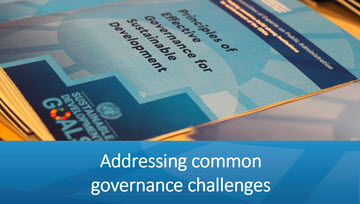Principles of effective governance for sustainable development
The 11 principles of effective governance for sustainable development, developed by the Committee and endorsed by ECOSOC in July 2018, aim to provide practical, expert guidance to interested countries on a broad range of governance challenges associated with the implementation of the 2030 Agenda for Sustainable Development. They highlight the need for pragmatic and ongoing improvements in national and local governance capabilities to reach the SDGs. The principles are grouped under the sub-headings of effectiveness, accountability and inclusiveness. They are linked to 62 commonly used strategies for operationalizing responsive and effective governance, many of which have been recognized and endorsed over the years in various UN forums, resolutions and treaties.
Explore the principles:
 |  |  |
|
|
Putting the CEPA principles into practice:
 |  | |
Learn how the principles are used as a reference point to advance effective governance for sustainable development in response to country requests. Download CEPA strategy guidance notes on a range of topics in institution-building prepared by some of the world’s leading experts.
| The principles provide an overarching analytical framework for assessing institutional capacity for achieving the SDGs. Studies by our partners explore the status of implementation of the principles in Africa and in Eastern Europe and Central Asia.
|
- Why do we need the principles of effective governance?
Institutions play a crucial role in the achievement of all SDGs and targets, but public sector reforms are required which remain a major challenge in many countries. Applying the principles and associated strategies to all public institutions can accelerate efforts to strengthen national and local governance capacities to achieve the 2030 Agenda and other international agreements.
- How can the principles of effective governance be of benefit?
The principles are designed to:
- Help interested countries, on a voluntary basis, build effective, accountable and inclusive institutions at all levels, with a view to achieving the shared vision for people and planet embodied in the 2030 Agenda
- Support countries in operationalizing the institutional aspects of SDG16 through concrete strategies
- Promote mainstreaming of effective governance in SDG implementation and development plans and programmes at all levels
- Engage the relevant UN organizations, regional organizations and professional and academic communities, in an inclusive manner, together with all relevant stakeholders
- Bring together proven standards and operational guidelines in all areas of public sector institution-building relevant to SDG implementation
- Provide a baseline for policymaking while strengthening evidence-based and action-oriented implementation of and follow-up to the 2030 Agenda
Publications
The principles of effective governance for sustainable development are available in six languages:
Arabic | Chinese | English | French | Russian | Spanish
 Добро пожаловать в ООН!
Добро пожаловать в ООН!

